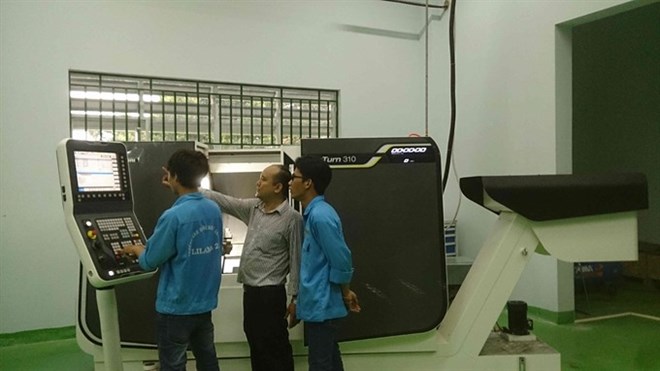
Close cooperation with the business sector will ensure that technical and vocational education and training (TVET) activities are effective and meet the needs of the market, experts have said.
Close cooperation with the business sector will ensure that technical and vocational education and training (TVET) activities are effective and meet the needs of the market, experts have said.
The Law on Vocational Education and Training regulates the reform of the TVET system, particularly the restructuring of the TVET institute network and the enhancement of the autonomy of TVET institutes in planning and performance, organisation, personnel and financing, said Vu Xuan Hung, Director of the Directorate for Vocational Education and Training’s Formal Education Department.
 |
| Trainees practise with modern machines at LILAMA 2 International College of Technology in Dong Nai province (Photo: lilama2.edu.vn) |
The TVET system cannot fulfill the industry’s demands in quality and quantity and TVET graduates’ skills and competencies do not match the needs of businesses, Hung said at a workshop held on October 22 in HCM City.
This is partly due to lack of cooperation between TVET institutes and the business sector, he said.
It is necessary to clearly define the rights and responsibilities of each stakeholder in TVET activities in which enterprises are involved, thereby building an effective co-operation mechanism among the State, enterprises and technical and vocational education and training institutes.
Incentive policies for teachers and in-company trainers need to be clarified, he added.
In order to enhance demand-oriented TVET in key sectors of the economy, since 2015, the programme “Reform of TVET in Vietnam” has piloted four cooperative training programmes in mechatronics, metal cutting, industrial electronics and sewage engineering technician at the LILAMA 2 International College of Technology in Dong Nai province and HCM City Vocational College of Technology.
The business sector is closely involved in all stages of the training process, from programme development to training implementation and assessment, said Jürgen Hartwig, programme director of Reform of TVET in Vietnam.
He suggested that cooperation between TVET institutes, students, companies, chambers and professional associations at all levels should be improved and expanded.
It should have participation of industry representatives/councils in the development and approval of standards, learning outcomes, and training programmes, he said.
The Reform of TVET programme in Vietnam cooperates with the Directorate for Vocational Education and Training under the Ministry of Labour, Invalids and Social Affairs.
It aims to improve the quality and orientation of training and the development of Centres of Excellence.
TVET reform initiatives are piloted at TVET institutes, and experiences and lessons learnt are integrated into system advice.
The programme from the 2010-20 period cooperates with 10 TVET institutes that are equipped with modern technical equipment.
Under the programme, international technical experts advise Vietnamese teachers and the management of the TVET institutes on technical and organisational issues.
(Source:VNS/VNA)



